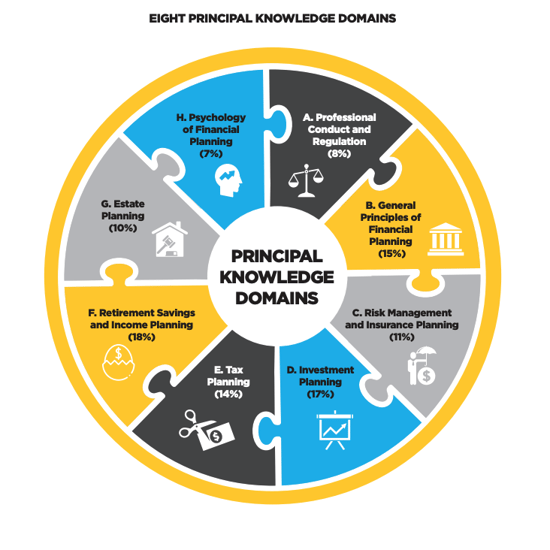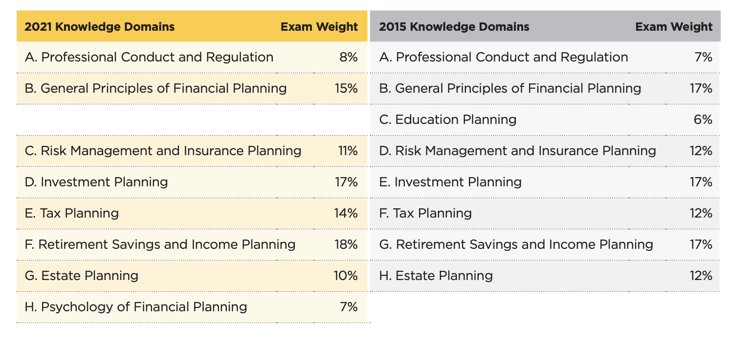The New CFP® Domain: Psychology of Financial Planning
Share this
For my fellow advisors out there that have been preaching that more emphasis is needed on human behavior and psychology when delivering advice, the new knowledge domain officially added in March 2022 to the CFP® exam will be marked a win. Unless you have been living in a bubble (nevermind—we all have), you should have seen that in March 2021, the Certified Financial Planner Board of Standards, Inc. (CFP Board) added "Psychology of Financial Planning" to their principal knowledge topics and is set to be implemented into the March 2022 exam. This addition is a new domain making it the eighth knowledge domain, representing 7% of the educational components of the exam.

The CFP® Board's eight knowledge domains
Wait, there is more to money than the numbers?
When I first read that the CFP Board acknowledged that psychology is part of financial planning, I wanted to say, “Look, Mom and Dad, my undergrad in psychology could be put to good use!”
Nevertheless, human psychology lives in all areas of our lives. In a familiar format, many of us have taken a form of psychometric test, especially ones that tell you what percentage you are as a character from pop culture franchises like Harry Potter, Game of Thrones, Star Trek, and Parks and Rec. (Here, I know you wanted the link).
However, those tests' validity is not rooted in science, and the personality test you took for your company is most likely a more reliable assessment. This is only one aspect of how psychology is interwoven into our personal and professional lives—and it doesn't end with personality assessments. We can postulate how psychology is in every part of our lives when it comes to our minds and behavior. I won't get (neuro) scientific with it today, but our lives are shaped by our psychological experience—our closest relationships, major life decisions, mental health, and yes, our money and finances are inseparable from our human thoughts and emotions.
Psychology is a wide-ranging, vast field of study with numerous sub-disciplines that fall under the larger umbrella, which is one of the reasons I am excited (cue snaps) about the format that the CFP Board has chosen to structure the new Psychology of Financial Planning domain. They've identified six main areas that comprise the first Psychology of Financial Planning section, which is a great starting point; we will review those areas below.
The Six Areas of Psychology of Financial Planning
The Psychology of Financial Planning domain is broken down into six key areas:
- Client and planner attitudes, values, biases
- Behavioral finance
- Sources of money conflict
- Principles of counseling
- General principles of effective communication
- Crisis events with severe consequences
When you review the CFP's side-by-side comparison of the 2021 principal knowledge domains (effective 2022) with those from 2015, you will see that two categories from 2015 moved from "General Principles of Financial Planning," helping create the new Psychology of Financial Planning domain.
Those two categories are:
1) Client and planner attitudes, values, biases, and behavioral finance
2) Principles of communication and counseling
Principles of communication and counseling were broken out into two separate categories, and behavioral finance was also separated from the 2015 categories. Sources of money conflict and crisis events with severe consequences are two completely new topics that made their way to the curriculum for Psychology of Financial Planning.
 CFP's side-by-side comparison of the 2021 principal knowledge domains (effective 2022) with those from 2015. Image credit: www.cfp.net
CFP's side-by-side comparison of the 2021 principal knowledge domains (effective 2022) with those from 2015. Image credit: www.cfp.net
The CFP Board well defines each category, and XYPN Partner DataPoints' CEO, Dr. Sarah Fallaw, summarizes the categories in her blog. Take a look at these resources for more details on each section.
As an advisor first and an academic second, I am immensely passionate about the real-life application of ideas and continuous learning. I presented a CE session on this domain during #XYPNLIVE 2021—if you missed it, I'll let you pass, but I'll be back again at #XYPNLIVE 2022 and hope to see you there! I genuinely loved the conversations that came from attendees, and I can't wait to connect with you all again. (Learn more about the conference and passes here.)
In the meantime, I want to provide a list of resources for you to pursue a deeper understanding of the Psychology of Financial Planning domain. I will not summarize each group; however, I am happy to discuss them with you, so reach out to me—some of these opportunities consist of a true financial commitment, and I have been through many of these programs and can offer my experience and advice.
Additional Resources for the Psychology of Financial Planning:
Education & Training- Wharton Client Psychology, CFP Board
- Harvard Behavioral Finance
- Golden Gate University
- Crieghton University
- Kansas State, Financial Therapy
- School of Advice, Carl Richards
Technology
Certifications & Designations
- Accredited Behavioral Finance Professional℠ ( ABFP℠)
- Behavioral Finance Advice™ (BFA™)
- Accredited Financial Counselor® (AFC®)
- Certified Financial Behavior Specialist® (FBS®)
- Registered Life Planners® (RLP®)
- Certified Financial Transitionist® (CeFT®)
Why is this a win?
With the addition of the Psychology of Financial Planning domain, the CFP Board is progressing and moving in a positive direction. Does change happen fast? Rarely. However, as the optimist that I am, I believe they will continue to expand on this knowledge and add new domains aligned with the ever-evolving financial planning profession. To my fellow advisors, always remember to continue your own education and keep having purposeful conversations with your clients to help them live more engaged and fulfilling lives.

About the Author
Jordan Hutchison is XYPN's Director of Partnerships. His favorite part about his job is finding partners perfectly positioned to help XYPN members build and scale the firms they have always wanted. When he's not exploring partnerships, Jordan loves basketball, reading, watching movies, and spending time with his wife and two kids. He also stays busy continuing his education—he'll have his doctorate completed soon to show for it! (If you want to talk about flow theory and financial planning, reach out because he does, too.)
Share this
- Advisor Blog (726)
- Financial Advisors (248)
- Growing an RIA (129)
- Business Development (100)
- Digital Marketing (97)
- Marketing (94)
- Community (82)
- Coaching (76)
- Start an RIA (76)
- Compliance (72)
- Running an RIA (72)
- Client Acquisition (68)
- Technology (67)
- Entrepreneurship (64)
- XYPN LIVE (64)
- Fee-only advisor (50)
- Sales (49)
- Bookkeeping (46)
- Client Engagement (45)
- Practice Management (44)
- Scaling an RIA (43)
- XYPN Books (43)
- Investment Management (41)
- Financial Education & Resources (35)
- Client Services (31)
- Employee Engagement (31)
- Lifestyle, Family, & Personal Finance (31)
- Market Trends (30)
- Journey Makers (26)
- Process (18)
- Niche (13)
- SEO (9)
- Career Change (8)
- Partnership (8)
- Sapphire (7)
- Transitioning Your Business (7)
- Persona (4)
- Social Media (4)
- Transitioning To Fee-Only (4)
- Emerald (3)
- Transitioning Clients (3)
- Onboarding (2)
- RIA (2)
- Transitioning to a Corporate RIA Affiliation (1)
Subscribe by email
You May Also Like
These Related Stories

Wealth and Well-being with Sarah Newcomb, Ph.D. at #XYPNLIVE 2022
Sep 8, 2022
3 min read

What Financial Advisors Need to Know About Custody
Nov 19, 2020
5 min read






